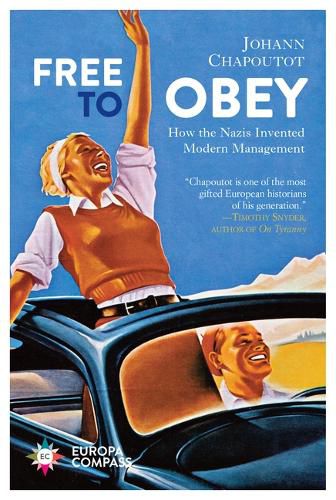Readings Newsletter
Become a Readings Member to make your shopping experience even easier.
Sign in or sign up for free!
You’re not far away from qualifying for FREE standard shipping within Australia
You’ve qualified for FREE standard shipping within Australia
The cart is loading…






What if the rules of modern management were written during the Third Reich?
Reinhard Hoehn (1904-2000) was a commander of the SS, one of Nazi Germany’s most brilliant legal minds, and an archetype of the fervid technocrats and intellectuals that built the Third Reich. Gone into hiding after 1945, he managed to survive unscathed the denazification process and reemerged in the 1950s as the founder and director of a management school in Bad Harzburg, Lower Saxony.
His story wouldn’t be too different from that of other prominent Nazis, if not for the fact that the great majority of Germany’s postwar business leaders–more than 600,000 executives from 2,600 companies–were educated at his school. Is this a coincidence? Or, as explains Johann Chapoutot, a brilliant historian of Nazism, is there a profound link between the forms of organization of Nazism and the prevailing principles and practices of corporate management?
As this illuminating study shows, at the core of Hoehn’s vision was a specific conception of freedom, which had deep roots in German history and which found expression in the role of the manager and the administrator. In this illiberal tradition, freedom is not just intended exclusively as freedom to act, but also as freedom to obey orders from above–to carry out one’s mission no matter the cost.
One of the most gifted European historians of his generation. –Timothy Snyder, author of On Tyranny
$9.00 standard shipping within Australia
FREE standard shipping within Australia for orders over $100.00
Express & International shipping calculated at checkout
Stock availability can be subject to change without notice. We recommend calling the shop or contacting our online team to check availability of low stock items. Please see our Shopping Online page for more details.
What if the rules of modern management were written during the Third Reich?
Reinhard Hoehn (1904-2000) was a commander of the SS, one of Nazi Germany’s most brilliant legal minds, and an archetype of the fervid technocrats and intellectuals that built the Third Reich. Gone into hiding after 1945, he managed to survive unscathed the denazification process and reemerged in the 1950s as the founder and director of a management school in Bad Harzburg, Lower Saxony.
His story wouldn’t be too different from that of other prominent Nazis, if not for the fact that the great majority of Germany’s postwar business leaders–more than 600,000 executives from 2,600 companies–were educated at his school. Is this a coincidence? Or, as explains Johann Chapoutot, a brilliant historian of Nazism, is there a profound link between the forms of organization of Nazism and the prevailing principles and practices of corporate management?
As this illuminating study shows, at the core of Hoehn’s vision was a specific conception of freedom, which had deep roots in German history and which found expression in the role of the manager and the administrator. In this illiberal tradition, freedom is not just intended exclusively as freedom to act, but also as freedom to obey orders from above–to carry out one’s mission no matter the cost.
One of the most gifted European historians of his generation. –Timothy Snyder, author of On Tyranny